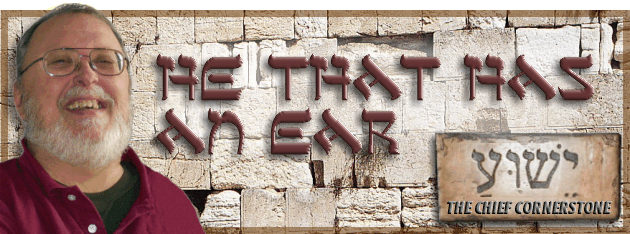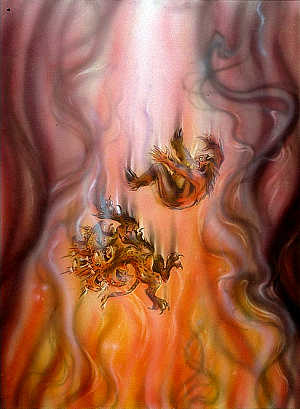Can we do תפילות prayers for:
haRold Smith and his ministry?
So that through them The האור Light, רפואה The Healing and The ואהבה Love of ישועת יהוה Yeshuath YHWH may come back to הארץ The Land of Israel?Difficulty Reading? Click http://hethathasanear.com then on the article for larger type.

| ||||||||||
|
"…let him hear what the Spirit says to the churches. To him who overcomes I will give to eat from the tree of Life, which is in the midst of the Garden of YHVH." Revelation 2:7 | ||||||||||
Part Two: Chasing Lucifer by haRold Smith a citizen of the Commonwealth (Ephesians 2:12) "How art thou fallen from heaven, O Lucifer, son of the morning! How art though cut down to the ground, which didst weaken the nations." Isaiah 14:12 KJV "He who hears you hears Me, he who rejects you rejects Me, and he who rejects Me rejects Him who sent Me." Then the seventy returned with joy, saying, "Lord, even the demons are subject to us in Your name." And He said to them, "I saw Satan fall like lightning from heaven. Behold, I give you the authority to trample on serpents and scorpions, and over all the power of the enemy, and nothing shall by any means hurt you. Nevertheless do not rejoice in this, that the spirits are subject to you, but rather rejoice because your names are written in heaven." Luke 10:16-20 Most of those who come from a Christian fundamentalist orientation, particularly from pentecostal or charismatic backgrounds (as was I for over 30 years), are taught that there is a continual, spiritual warfare being waged around them with demon spirits whose sole purpose lies in preventing them from acquiring all the good God has for their lives while here on earth. The actual spiritual warfare scripture says we are engaged in, however, is quite different and will be thoroughly discussed in a subsequent article. While not denying the presence of evil in the world or that demon spirits exist; in this article, since all of the activities of these spirits are supposedly orchestrated by a central figure, it behooves us to look at this figure in the light of what the original words of scripture actually say about him. As traditionally taught, his name is "Lucifer" (more commonly known as "Satan" or "the Devil") - a rebellious archangel who, having been cast out of heaven to earth from the beginning for his sinful acts, has been engaged in waging a warfare with YHVH ever since. It will come as a surprise to many to learn that the only reference to a "Lucifer" in all of scripture is only found in this verse from Isaiah 14:12 above, supposedly describing his fall from heaven due to pride - and this name appears only in the KJV or related versions. In spite of this rendering, however, the proper name "Lucifer" is not found anywhere in the Original Hebrew text or even in the translated Messianic Writings. Plus, to add to the confusion, Lucifer is a Latin name - so how did this Latin name find its way into a Hebrew manuscript, written centuries before a Roman language even existed? Just who is this guy, Lucifer, and more importantly - where did he come from? In Hebrew, the phrase translated as "Lucifer, son of the morning" is helel ben shachar (click on highlighted words to view content) and should more accurately be translated as "shining one, son of the dawn" (as it is in the ESV). There is no proper name mentioned in this passage in the original Hebrew. The context of the whole passage of Isaiah 14 is not about a fallen angel, but an obvious epithet about a fallen Babylonian king who, during his lifetime, had persecuted the children of Israel. It also contains no mention of Satan, either by name or reference. Why, then, did the translators of the King James find it necessary to insert "Lucifer" for "shining one" in this passage? The answer lies in two earlier translations. The first translation of the Original Hebrew scriptures into Greek occurred 300 years before Yeshua by Ptolemy Philadelphus, the Greek-speaking Pharaoh of Egypt for his own library (285-247 B.C.E.). As seen in the last article, Defining Enemies, while local cultures spoke their native languages among themselves, Greek was the universal language spoken between cultures (much as English is the universal language today). The seventy-two scholars commissioned by Pharaoh to perform this translation became known as "The Seventy" with the translated document itself called "The Septuagint" or "LXX" (the Roman numerals for "70"). The Original Writings found in the bibles of today are an English translation of this Greek Septuagint - not translated from the original Hebrew texts. In translating Isaiah 14:12, the Seventy chose the Greek word, heosphoros, for the Hebrew helel ben shachar. Heos means "in or of the morning" and phoros means "that which is borne, or bearing." This is not an exact translation of the original Hebrew, but is reasonably close. As empires rose and fell, the fortune of languages rose and fell with them. Since Greek is a very different language than Hebrew, much of the original Hebrew meanings, nuances and intent became lost in the LXX through the ages. The longer the Romans ruled, the more prominent the official language of the Roman Empire became - and that language was Latin. By 325 AD, during the reign of Constantine, the Roman Empire co-opted gentile Christianity, politicized it, and made it the new state religion (see the Church for more detail). Shortly thereafter, the Latin "father", Jerome (340 AD – 419 AD), who had risen to prominence within the Roman Catholic Church hierarchy, began work on a Latin translation of the Bible at the suggestion of Pope Damasus. After 20 years of toil, in the year 405 AD, the translation now known as the Vulgate was completed - seven centuries after the LXX translation, While Jerome used the LXX version along with the Hebrew in translating to Latin, most historians and biblical scholars concede that the Vulgate can be charged with innumerable faults, inaccuracies, inconsistencies, and arbitrary dealing in particulars - this verse from Isaiah 14:12 stands in testimony to that fact, Jerome did not strictly translate the Hebrew helel ben shachar, nor did he use the Greek (LXX) heosphoros (which term, by his day, had fallen largely into disuse). Instead, he chose to base his translation largely on the Latin word lukophos - which, by Jerome's time, had become an epithet for the Greek gods Apollo and Pan who were worshipped alongside that of the first light of the dawn, the morning star Venus. The word Lucifer comes from the Latin lux. meaning "light" and ferre "to bear or bring", hence "light bringer" - but there is no scriptural justification for an arbitrary personification of that translated word. The problem encountered here is, in spite of the traditional theology handed down through hundreds of generations as a result of this arbitrary translation and promoted as truth; according to the wording of the original Hebrew - the Bible contains no character named Lucifer. Isaiah had never heard of such a being, nor had the apostles of Yeshua's day or even Yeshua Himself. Lucifer, characterized as a persona who is a manifestation of the devil, is a much later invention - there is no association between helel ben shachar of Isaiah 14:12 and Satan. The proper name "Lucifer" does not find its way into any translation until Jerome’s time, some 150 years after the influence of the writings of earlier Catholic theologians Tertullian (160-230 AD) and Origen (185-254 AD) who had begun to symbolically read Satan into the story of the King of Babylon in Isaiah 14. However, if read in its proper context, the prophet Isaiah is taunting a man - the king of Babylon in power at the time: "In the poetic and figurative language of the Hebrews…a star signifies an illustrious king or prince…The monarch here referred to, having surpassed all other kings in royal splendor, is compared to the harbinger of day, whose brilliancy surpasses that of the surrounding stars" (A Cyclopedia of Biblical Literature, John Kitto ed., 3rd ed., J. B. Lippincott and Co, Philadelphia, 1866, 2:857-8). While there are those who claim that the real entity symbolically addressed in this passage is the persona, "Satan" - \there is no scriptural evidence to support this theory. To the contrary, Isaiah 14:16 says: "Is this the man who made the earth tremble…?" and in 14:18, "All the kings of the nations lie in glory, each in his own tomb; but you are cast out…" - clear references to a man, the king of a nation, not an archangel.
The reason this transliterated Hebrew word, satan, that means “adversary” has become associated with a persona called "Satan" is because this Hebrew word was translated using the Greek word diabolos, which means “devil” - then assumed to characterize a persona. But the Hebrew word, satan, is never found to be an entity. Here again, we find the theological influence of the translators overwriting the original Hebrew perspective to support a replacement theology. In Hebrew, however, the word, satan, is projected as an opposing force with all of the following meanings: divide, set at odds with, accuse, slander, reject, deceive, oppose, be adversarial - but not once is it distinguishable as a persona. The Hebrew word satan exposes the principal strategy of evil – a force of determined opposition to the Words of YHVH which, at their core, is found the thread of selflessness - looking upon the issues of others as being more important than my own (Philippians 2:4, Luke 9:23, Exodus 20:1-17). Yeshua's Life is the testimony of the triumph of YHVH's power through submission - the power of weakness manifest in not seeking an individual's will (Philippians 2:1-11, see what it means To Be Free). The force of evil is found in self-determination which is in opposition to self-denial. The force of evil is the attempt to manipulate control over circumstance by insisting on individual "rights". To engage in activity that stands in opposition to the Words of YHVH is to participate in the construct of the force of evil. Wherever opposition to YHVH’s purposes arises, there is always satan (James 3:16). If YHVH is the good found in Exodus 20 - then, whatever force opposes that good is considered evil (John 14:23-24, see Perspective for a more in-depth look). This same view holds true for "the serpent" of Genesis 3, widely regarded in Christian theology to be an angel that had sinned, called “Satan”, and having been thrown out of heaven for his sin, he came to earth and tempted Eve to sin. However, the Hebrew word satan does not appear anywhere in the Book of Genesis. In these passages, more than anywhere else in scripture, we run the danger of eisegesis (reading into the text) rather than exegesis (reading out of the text) - reading what the words actually say, rather than projecting our own preconceived ideas onto the text and calling the process "Biblical interpretation". Metaphor, allegory and symbolism are problematic when approaching scripture. Words like "do not lie", "do not murder" or "do not commit adultery" are universally understood literally at their face value. So, since much of the words of scripture are to be taken literally (and we are not given a codex anywhere spelling out what to follow); then, which words are to be taken literally and which words are to have symbolism, metaphor or allegory applied to them - and who gets to decide which ones are which? The Torah does not speak in purely symbolic, abstract concepts - there is always a literal reality at the core of the subject, which is only then interpreted in a symbolic way to underscore and enhance the truth contained in that reality. The serpent, therefore, begs to be understood in this context as just that - a serpent. Not much information is given in scripture about the serpent; but, in Genesis 3:1, scripture clearly states in that the serpent was one of the most intelligent of all the animals that had been created - another angelic being called "satan" did not morph into or enter the serpent. The fact that the serpent was created like the other "beasts of the field" in Genesis 1:24-25 and "was good" also dispels any notion of the presence of an evil angelic being. That evil should even be associated with satan at all is highly suspect. In the Original Writings, satan was not considered to be an evil persona, but only became identified as such in the translated versions of the Messianic Writings. Accordingly, satan is an implement used by YHVH to accomplish specific purposes. There is much in the Book of Job to support this view with satan appearing only in the first two chapters and then disappears. Some believe the first two chapters were added much later, for in the last chapter we read: "…they showed him sympathy and comforted him for all the evil that YHVH had brought upon him" (Job 42:11). In Isaiah 45:7 YHVH says: "I form light and create darkness, I make peace and create evil; I, YHVH, do all these things." The Hebrew word translated "evil" in both of these verses is ra', which primarily means "calamity". YHVH uses calamitous evil to incentivize men into seeking Him. Sinful evil, which is standing in opposition to YHVH's purposes found in His Words, originates with man (Romans 5:12, James 1:13). Valentine's Jewish Encyclopedia confirms the idea that there is a radical difference between how satan is conceived in the Original Writings and the conception portrayed in the Greek to Latin to English New Testament - and that this new role as an evil persona did not develop from the original role. There are no references "…to rebellious angels in any pre-Christian book…The figure of Satan in the Hebrew Bible and in the New Testament respectively emphasizes the difference in conception. There is no development, but a basic difference…It is only in Christian literature that the Persian idea of two opposing empires, with Satan as God's enemy, has persisted" (Valentine's Jewish Encyclopedia, A. M. Hyamson & A. M. Silberman eds., Shapiro, Valentine & Co, London, 1938, p. 36). With Job, YHVH was endeavoring to refine a particular character of his spirit - that of pride. The Hebrew definition of purity is "to be refined by fire". This Hebrew perspective of the purpose of evil will also be thoroughly discussed in a subsequent article of this series (until then, see what it means to Cultivate Virtue).
The "lightning" used by Yeshua in Luke 10:18, however, does not appear in the Hebrew of the Isaiah 14 passage, saying only that this "bright star has fallen from heaven". This Greek word, astrape, translated "lightning" in Luke 10:18), is actually derived from the root word aster, which means "a star" (also found in Mark 13:25 describing the same event). Remembering Yeshua's words of Luke 17:20-22 that heaven is within, then the "heights" this King of Isaiah 14 has ascended to is the elevation of the arrogance found in his own heart. The Hebrew word translated "fallen" in this passage is naphal, whose primary meaning is to "lay prostrate" - the same definition given to the Greek word pipto, translated "fall" in Luke 10. This is a position of homage shown to a greater power. When the "woes" of Isaiah 14:21-32 are proclaimed against those who have set themselves in opposition against YHVH through the persecution of His Family (Babylon being the foremost along with Assyria and Philistia) can be seen from this Hebrew perspective comparatively alongside the "woes" of Luke 10:13-15; then we can see the satan Yeshua is referring to in verse 18 as being the same taunt spoken of in Isaiah 14:12 against forces of opposition ascending to heights of control and manipulation toward YHVH's Words, manifest in the pure hearts of His Family, Israel (Psalm 73:1). Yeshua was reaffirming the Words He had been taught from His Father - not injecting new doctrine.
Please feel free to email them to me at harold@hethathasanear.com. While not claiming to have all the answers, it would be an honor to share with you what the Spirit is uncovering. | ||||||||||
|
| ||||||||||
|
"Pray for the peace of Jerusalem: They shall prosper that love you." (Psalm 122:6) (prosper - from the Hebrew, "shalav", meaning "to be at rest") Please visit the website http://hethathasanear.com for other articles and videos or for information if you feel led to contribute to this ministry. Click here to watch the short movie Maranatha!. | ||||||||||
|
Shalom Alechem B'Shem Yeshua HaMashiach. (Peace be unto you in the Name of Yeshua the Messiah) | ||||||||||
|
haRold Smith
http://hethathasanear.com harold@hethathasanear.com CLICK IMAGE TO VIEW VIDEO |

|
Click Here to Subscribe | ||||||||
Please Say Yes to Abba Yahweh and His Laws.
Please read the Mitzvoth go to: Positive Commandments and the Negative Commandments), easy to read. It is very important to know them. For, the understanding of the rest of The Scriptures.
Hab 2:3 For the chazon (vision) is yet for a mo’ed (an appointed time); it speaks of HaKetz (the End), and does not lie; though it tarry, wait for him
Moshiach— see: Sanhedrin 97b, ‘It has been taught; R. Nathan said: This verse pierces and descends to the very abyss:11 For the Vision is yet for an appointed time, but at the end it shall speak, and not lie: though he tarry, wait for him (Moshiach); because it will surely come, it will not tarry.12]; because he (Moshiach) will surely come, and will not tarry.
(11) Just as the bottom of an abyss cannot be reached, so is it impossible to grasp the full purport of this verse (Rashi).
(12) Hab. II, 3.
Believe…..
Please read the Mitzvoth go to: Positive Commandments and the Negative Commandments), easy to read. It is very important to know them. For, the understanding of the rest of The Scriptures.
Hab 2:3 For the chazon (vision) is yet for a mo’ed (an appointed time); it speaks of HaKetz (the End), and does not lie; though it tarry, wait for him
Moshiach— see: Sanhedrin 97b, ‘It has been taught; R. Nathan said: This verse pierces and descends to the very abyss:11 For the Vision is yet for an appointed time, but at the end it shall speak, and not lie: though he tarry, wait for him (Moshiach); because it will surely come, it will not tarry.12]; because he (Moshiach) will surely come, and will not tarry.
(11) Just as the bottom of an abyss cannot be reached, so is it impossible to grasp the full purport of this verse (Rashi).
(12) Hab. II, 3.
Believe…..
Hab 2:4 Hinei
(behold), his nashamah (soul) which is puffed up is not upright in him; but the
tzaddik (righteous) shall live by his emunah (believe).
Through Moshiach, Yeshuah from Yahweh who give you emunah (believe)…..
Gen 15:6 And he believed in Yahweh; and He credited emunah (faith)] to him as tzedakah (righteousness).
Please read the whole book of HaNavi Habakuk?
The Koran teaches us that you have to die…….
Through Moshiach, Yeshuah from Yahweh who give you emunah (believe)…..
Gen 15:6 And he believed in Yahweh; and He credited emunah (faith)] to him as tzedakah (righteousness).
Please read the whole book of HaNavi Habakuk?
The Koran teaches us that you have to die…….
But, please Yudah (Jews) and Ephraim (most Christians) Listen to His Voice:
Hab 1:12 Art thou not mikedem
(‘everlasting’
also said of Moshiach, indicating Moshiach’s eternal divine nature: Dan 7:14 And there was given Him (Moshiach) dominion,
and honor, and sovereignty, that all people, Goyim, tongues, should pey-lammed-chet.
[1] (worship as deity) (see Dan 3:12, serve, reverence as deity Him (Moshiach).
His dominion is an everlasting dominion, which shall not pass away, and His
(Messianic) Kingdom that which shall not be destroyed.] see Michah
5:1[2];)
Yahweh
Elohai (my Elohim) Kedoshi (my Holy One)? We shall not die. Yahweh, Thou hast
appointed them (these Chaldean) for mishpat (ordinance); O Tzur, Thou hast
ordained them (these Chaldean) for reproof.
Please take it serious what Abba Yahweh is telling us in:
Deu 18:15 Yahweh Eloheicha (your Elohim) will raise up unto thee a Navi (prophet) from among thee, of thy achim (bretheren), kamoni (like me.....
Exo 32:30 The next
day Moshe said to the people, "You have committed a terrible sin. Now I
will go up to Yahweh; maybe I will be able to atone for your sin."); unto
him ye must listen;
Deu 18:16 According to all that thou
desired of Yahweh Eloheicha (your Elohimin) Chorev (to be burnt dried up,
ruined, wasted) in the Yom HaKahal (day of the congregation), saying, Let me
not hear again the voice of Yahweh Elohav (your Elohim), neither let me see
this eish hagedolah (‘great fire’) any more, that I die not.
Deu 18:17 And Yahweh said unto me, They
have well-spoken that which they have spoken.
Deu 18:18 I will raise them up a Navi
(prophet) from among their achim (brethren), like unto thee, and will put My
words in his mouth; and he shall speak unto them all that I shall command him.
Joh
10:18
No one takes it from me, but I lay it down of my own accord. I have samchut
(authority) to lay it down, and I have samchut to receive it again. This
mitzvah I received from HaAv (the Father).
Deu 18:19 And it shall come to pass,
that whosoever will not listen unto My words which he shall speak Bishmi (in My
Name), I will require it of him.
Joh 8:28 Therefore, Rebbe,
Melech HaMoshiach said to them, When you perform the hagbah (lifting
up) of the Ben HaAdam, you will have da'as (knowledge) that Ani Hu
[YESHAYAH 41:4; SHEMOT 3:14-16], and from myself I do nothing, but as HaAv (the
Father) of me taught me, these things I speak.
Rebbe, Melech HaMoshiah Yeshuah – is Yeshuah Yahweh. Like it is said in:
Gen_49:18 I have waited for Thy Yeshuah (Salvation), Yahweh.
Rebbe, Melech HaMoshiah Yeshuah – is Yeshuah Yahweh. Like it is said in:
Gen_49:18 I have waited for Thy Yeshuah (Salvation), Yahweh.
Exo_15:2 Yahweh is my oz and zimrah (song of praise), and He is become to me Yeshuah (salvation); He
is Eli (my Elohim), and I will praise Him; Elohei Avi (the Elohim of my
Father), and I will exalt Him.
And not a half-god, or another mighty-one who came between HaShem and us! (Not, ‘It Suph’!) I believe many of us (Jews and Ephraimites!) have to learn that!
And not a half-god, or another mighty-one who came between HaShem and us! (Not, ‘It Suph’!) I believe many of us (Jews and Ephraimites!) have to learn that!
[1]
Dictionary of the Talmud. M. Jastrow p. 1178 פלח
















No comments:
Post a Comment